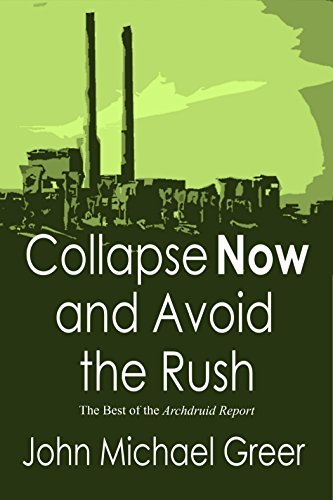Now for something a little different. John Michael Greer offers a unique perspective on the idea of preparing for collapse, one that’s well worth adding to your mental toolbox. Below are some of my key takeaways, with my own spin:
Your stockpile of canned beans won’t save you. That generator collecting dust in your garage? Useless when the gas stations run dry. John Michael Greer’s Collapse Now and Avoid the Rush doesn’t just challenge your prepping strategy—it sets it on fire and watches it burn.
the collapse is already chewing through your front door
Greer’s opening salvo lands like a sledgehammer: “civilizations don’t fall like trees in a storm. They rot like old floorboards—one splinter at a time, until your foot goes through.” That pothole swallowing your street whole? The grocery store’s half-empty shelves? The neighbor who stopped paying rent last month? These aren’t warning signs. They’re collapse in action.
During the 2023 Portland heatwave, the rich fled to air-conditioned hotels while the prepared survived with basement ice baths and stolen traffic cones repurposed as solar stills. Greer would call this “collapse literacy”—reading the writing that’s been on the wall since your grandparents’ time.
your prepping is killing you slowly
the stockpile delusion
That mountain of freeze-dried meals? A psychological crutch. Greer eviscerates this mentality: “hoarding for doomsday is just capitalism’s final joke—paying today’s inflated prices to avoid tomorrow’s inevitable shortages.” The 2020 toilet paper panic proved how quickly stockpiles become liabilities when everyone’s guarding theirs with shotguns.
Real urban survivors operate differently. In Detroit’s collapse neighborhoods, the smart ones planted fruit trees in abandoned lots rather than stockpiling canned peaches. Their reward? Fresh food and protection from looters who wouldn’t damage their own future meals.

the skills mirage
Your weekend bushcraft course is worthless. Greer notes: **”modern people mistake competency porn for actual survival skills.” Starting a fire with flint looks tough on Instagram, but can you darn socks? Repair shoes? Make a weeks-old cabbage palatable?
A Brooklyn mechanic turned Greer’s advice into action. He traded free bike repairs for gardening lessons, then converted his fire escape into a micro-farm. Now his “preps” include neighbors who’ll warn him about trouble and share their harvests.
the greer survival triad (with teeth)
1. personal downsizing: bleed the beast
Greer’s prescription stings: “cut one modern convenience every season before it’s cut for you.” This isn’t about playing pioneer—it’s strategic withdrawal.
– Replace your gym membership with calisthenics in the park (free, and you learn the terrain)
– Swap Uber for a cargo bike (you’ll discover which alleys are safest)
– Cancel Netflix and organize a neighborhood skill-share night
A Chicago nurse took this to heart. She replaced her $300/month takeout habit with a pressure canner and communal cooking sessions. Now she eats better and knows who in her building has medical training.
2. community weaving: the spider’s game
Greer’s brutal truth: “your guns won’t protect you from twenty hungry neighbors.” The 1992 LA riots proved this—Korean shopkeepers survived not through firepower, but because they’d formed neighborhood watches before the crisis.
Start here:
– Host a “broken things” party where people bring items to fix
– Create a street map of skills (who can sew? who knows plumbing?)
– Barter babysitting for gardening help (builds reciprocal obligation)
3. psychological terraforming
The book’s hardest lesson: “grieve for your dying world now, or you’ll be paralyzed when it finally gasps its last.” Greer documents how the most prepared Y2K “survivalists” became the most dysfunctional when January 1, 2000 arrived without incident.
Try this tonight:
– Write your obituary for the life you’re losing (air travel, cheap meat)
– Keep a “loss journal” to process the grief
– Practice “maybe thinking” (“maybe I’ll walk rather than drive today”)
urban collapse hacks that actually work
water: the silent killer
Greer’s warning chills: “the romans didn’t die of thirst when their aqueducts failed. They died because they’d forgotten how to collect rain.”
Apartment solutions:
– Turn your bathtub into a reservoir with a $20 bladder
– String fishing line between fire escapes to harvest dew
– Learn which public fountains still flow during outages
food: guerrilla gastronomy
Forget your pathetic window herb garden. Greer praises “the italian nonnas who turned bomb craters into vegetable patches during WWII.”
Modern versions:
– Mushroom logs in the closet (oyster varieties grow on coffee grounds)
– Cricket farms under the bed (65% protein, zero space)
– Graft fruit tree cuttings onto city-owned ornamental trees
energy: the quiet descent
Your solar panels are worthless when looters come knocking. Greer suggests: “become uninteresting to failing systems.”
Stealth adaptations:
– Thermal curtains made from moving blankets (cuts heat loss 40%)
– A bicycle generator powering only your fridge (silent, unappealing to thieves)
– Moonlight gardening on your balcony (no electric lights to attract attention)

stress-testing your new reality
quarterly collapse drills
1. The blackout weekend
– No electricity, including phones
– Cook using only what’s in your cupboards
– Navigate to a meetup spot using paper maps
2. The cashless challenge
– Barter services for necessities
– Keep a ledger of transactions
– Identify which skills are truly valuable
3. The 10-mile test
– Travel across town without fossil fuels
– Carry 25lbs of “supplies”
– Document safe routes and danger zones
the annual reckoning
Greer’s brutal advice: “inspect your preps like a medieval monk counting lentil stores—with cold-eyed pragmatism.”
The checklist:
– Dump every water container and refill (biofilm kills)
– Test every tool under realistic conditions
– Audit your community web (who moved? who learned new skills?)
when theory meets pavement
success stories
Detroit’s urban farmers now produce 15% of the city’s fresh vegetables in vacant lots. Their secret? They started **before** the grocery stores closed.
failure museums
Venezuelan gold hoarders starved with full safes. Their mistake? They forgot that **”edible is the new gold standard.”**
the greer gauntlet
Your move. That stockpile in your closet? It’s mocking you. Those unused skills? They’re rotting faster than last year’s canned goods. Greer’s final warning: “collapse isn’t coming for you. You’re standing in its belly. Start acting like it.”
Tonight’s homework:
1. Identify one modern convenience to abandon this week
2. Map three water sources within walking distance
3. Have one uncomfortable conversation with a neighbor
Tick tock. The great unraveling won’t wait for you to catch up.
